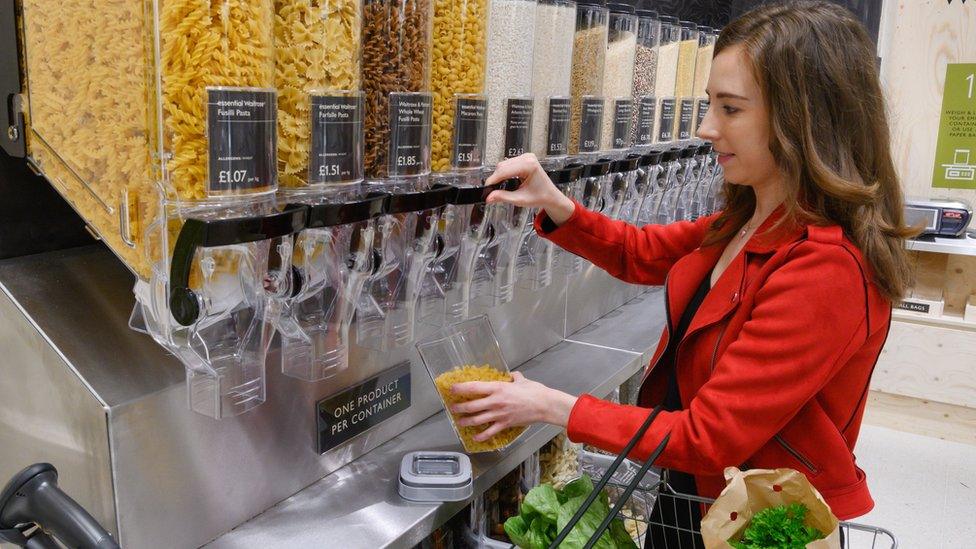Zero waste? Waitrose launches packaging-free trial
- Published
- comments

Waitrose supermarket is letting customers in one of their stores fill their own containers as part of a trial to cut waste.
Pasta, rice and washing up liquid are some of the products that shoppers will be able to buy from a refill station in Oxford.
The supermarket has also said that plastic packaging will be removed from flowers and more fruit and vegetables will be sold loose.
Supermarkets have been criticised by campaigners for not doing enough to protect the environment.
So what else have supermarkets been doing to try to become greener?
Plastic bags
Before 2015 supermarkets like Tesco used more than 7 billion plastic bags in a year
In 2015, major supermarkets were made to introduce a plastic bag charge because of the damage the single-use plastic was doing to the environment.
Since then Morrisons has bought in paper bags for groceries at supermarket check-outs and is raising the price of its plastic bags by 50%.
The supermarket will now charge 15p instead of 10p for its cheapest standard plastic bag, while testing out US-style paper grocery bags with handles costing 20p.
According to government figures in 2018, the number of single-use plastic carrier bags sold per year by seven supermarket chains - Tesco, Sainsbury's, Asda, M&S, the Co-op and Waitrose, along with Morrisons - has gone down to just over 1 billion, down from more than 7 billion before 2015.
Other plastics
Plastic pollution is one of the environmental issues protesters are worried about
Carrier bags are just one small part of the plastics problem.
From plastic packaging on fruit and vegetables, to plastic in products, the UK's main supermarkets reportedly create almost one million tonnes of plastic packaging waste every year.
Tesco, the Co-op and Morrisons have all pledged to make plastic in their own brand products recyclable in the next few years. Tesco also banned microbeads from its products more than a year before the nationwide ban came into force.
Did you know most tea bags contain plastic? With millions of cups of tea being drunk everyday it's one of the reasons the Co-Op became the first retailer to take plastic out of the millions of tea bags they sell.
Palm oil
Palm oil comes from oil palm trees like these one sin Borneo
Palm oil is the most widely consumed vegetable oil on the planet and is found in many packaged products like margarine, peanut butter and soap.
Palm oil grows in tropical rainforests, and the uncontrolled clearing of these forests for palm oil plantations has led to widespread loss of these irreplaceable and biodiverse-rich forests.
Selfridges became the first major retailer to remove palm oil from all of its own-brand food products.
Iceland have removed palm oil from all of their own-label products.
Other UK supermarket chains, including Tesco, Sainsbury's, Morrisons and Waitrose, have pledged to only source sustainable palm oil.
Food waste
Not throwing away misshapen vegetables like these helps prevent food waste
Today, an estimated one-third of all the food produced in the world goes to waste.
When food is wasted, all the energy and water it took to grow it is wasted. And if the food goes to landfill and rots, it produces methane, a greenhouse gas.
For many years, supermarkets wouldn't sell less-than-perfect produce, but Waitrose, Tesco, Asda, Morrisons and Aldi all now sell misshapen or 'wonky' vegetables instead of discarding them.
Many of the major supermarkets have made a promise they will reduce food waste by 2030.
Fish
Many fish fingers do use sustainable fish
Many marine ecologists think that the biggest single threat to marine ecosystems today is overfishing.
One of the way people can help is buying sustainable fish and not eating the same types of fish so that those stocks don't run out..
Aldi stocks the highest proportion of sustainable-certified seafood of any supermarket in the UK, according to the Marine Stewardship Council, the organisation which points people to the most sustainable fish to buy.
The Marine Conservation Society said most supermarkets' own brand fish fingers come from sustainable sources.
Many environmental campaigners say it is better for the environment not to eat fish at all.
- Published11 November 2018
- Published9 January 2018
